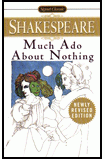After Reading the Play
To become a lover of Shakespearean drama it is essential that the reader/observer understand it. These follow-up activities are designed to help students develop as full an understanding as possible.
Follow-Up Activities:
- Do some creative writing:
A. Become a character and write about what is likely to happen after the play has ended.
B. Write a poem about a character or some aspect of the plot.
C. Write a song about/for one of the characters.
D. Do a character sketch of one of the characters.
E. Develop a class newspaper within the setting of the play. Assign each student to a newspaper staff. Write articles about the characters, plot, locale, reviews of other timely plays, other events that might have taken place during the action of the play... - Discuss the underlying meaning (theme) of the play. What was Shakespeare saying to his audience? Why is the play still popular today?
- Do some imagining exercises:
A. Become an actor on the Elizabethan stage.
B. Become a member of the audience.
C. Become a royal patron of the theater.
Use the imaging as the basis for role-play or creative writing.
- Become Shakespearean critics. Read one or two of the "Commentaries" at the end of the Signet Classic. Discuss the "Commentaries" in small groups. Have the students pick a topic to explore. Write a brief critical essay, using the "Commentaries" as models.
- Have students critique their own performance. If you have taped the classroom drama, have them evaluate their performance. They can evaluate it by comparing it to a record or film/videotape of the same scene(s). Or, they can compare the different portrayals of the same character in classroom dramas with more than one person playing each role. How are the performances different? What is the strength of each? How did the actors interpret the character/scene differently? If you could do your performance again, how would you change it?
Shakespeare wrote his plays for the enjoyment of his audience. The Signet Classic Shakespeare Series has been revised to help bring Shakespeare's plays to life for students. By using this series along with our own enthusiastic teaching, we can turn our students into lovers of Shakespearean drama.














